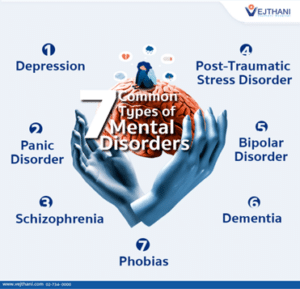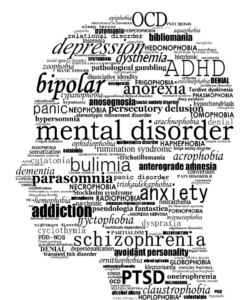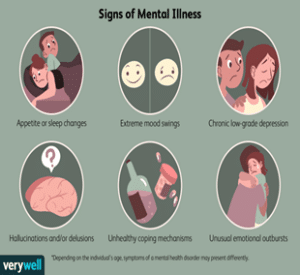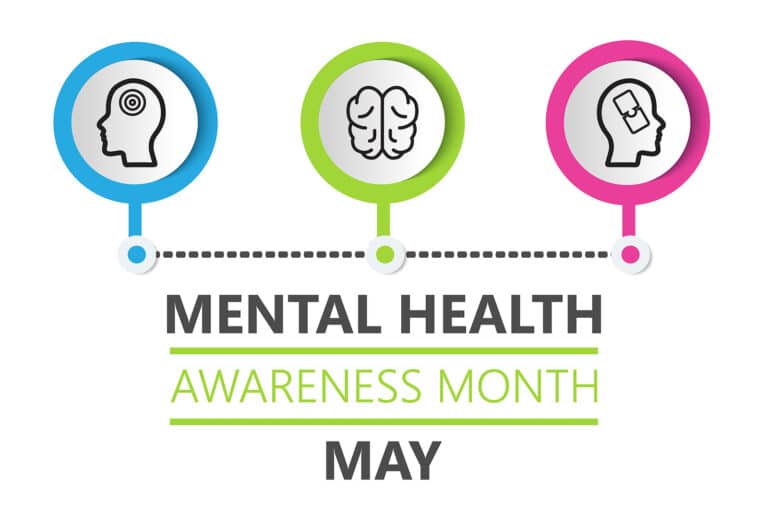It’s a time for us all to remember that taking care of our mental health is just as important as taking care of our physical health.
What is Mental Health?
Mental health includes our emotional, psychological, and social well-being. It affects how we think, feel, and act, and helps determine how we handle stress, relate to others, and make choices.
Mental health is important at every stage of life, from childhood and adolescence through adulthood. Over the course of your life, if you experience mental health problems your thinking, mood, and behavior could be affected.

Mental Health Conditions
Mental illnesses are disorders, ranging from mild to severe, that affect a person’s thinking, mood, and/or behavior. According to the National Institute of Mental Health, nearly one-in-five adults live with a mental illness.
Many factors contribute to mental health conditions, including:
• Biological factors, such as genes or brain chemistry
• Life experiences, such as trauma or abuse
• Family history of mental health problems
Early Warning Signs & Symptoms

• Eating or sleeping too much or too little
• Pulling away from people and usual activities
• Having low or no energy
• Feeling numb or like nothing matters
• Having unexplained aches and pains
• Feeling helpless or hopeless
• Smoking, drinking, or using drugs more than usual
• Feeling unusually confused, forgetful, on edge, angry, upset, worried, or scared
• Yelling or fighting with family and friends
• Experiencing severe mood swings that cause problems in relationships
• Having persistent thoughts and memories you can’t get out of your head
• Hearing voices or believing things that are not true
• Thinking of harming yourself or others
• Inability to perform daily tasks like taking care of your kids or getting to work or school
Tips for Living Well with a Mental Health Condition
Having a mental health condition can make it a struggle to work, keep up with school, stick to a regular schedule, have healthy relationships, socialize, maintain hygiene, and more.
However, with early and consistent treatment—often a combination of medication and psychotherapy—it is possible to manage these conditions, overcome challenges, and lead a meaningful, productive life.

• Stick to a treatment plan. Even if you feel better, don’t stop going to therapy or taking medication without a doctor’s guidance. Work with a doctor to safely adjust doses or medication if needed to continue a treatment plan.
• Keep your primary care physician updated. Primary care physicians are an important part of long-term management, even if you also see a psychiatrist.
• Learn about the condition. Being educated can help you stick to your treatment plan. Education can also help your loved ones be more supportive and compassionate.
• Practice good self-care. Control stress with activities such as meditation or tai-chi; eat healthy and exercise; and get enough sleep.
• Reach out to family and friends. Maintaining relationships with others is important. In times of crisis or rough spells, reach out to them for support and help.
• Develop coping skills. Establishing healthy coping skills can help people deal with stress easier.
• Get enough sleep. Good sleep improves your brain performance, mood and overall health. Consistently poor sleep is associated with anxiety, depression, and other mental health conditions.
https://en.wikipedia.org/wiki/Mental_health
https://www.samhsa.gov/mental-health
https://en.wikipedia.org/wiki/Mental_health
- The Superfood You Shouldn’t Miss - April 9, 2025
- First Home Care Visit? Here’s The Inside Scoop - April 9, 2025
- Are Seniors Ready for a Disaster? - April 7, 2025


